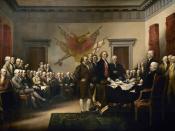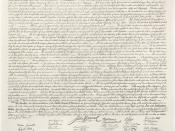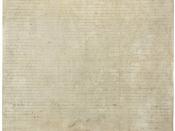In What Did the Declaration Declare?, Joseph J. Ellis, an editor for history publications presents various historical perceptions on the analytical conception of this mythic text of American public life. The Declaration of Independence has enjoyed a long and useful career as an expression of "natural rights," providing Americans with an influential statement of their national doctrine. Thomas Jefferson had no reason to believe that he was writing a document that would become so revered throughout the ages. One may confirm the Declaration's idealistic origins by examining Carl Becker's enduring argument that the Declaration was an American product of the doctrines of John Locke. The Declaration was composed for a specific purpose. The members of the Continental Congress were more preoccupied with handling pressing military matters and meeting with delegates in the separate colonies, who were busy drafting and debating new state constitutions. This book by Ellis also provides a general, philosophical justification for revolution based on the colonist's growing feeling of entitlement of Lockean rights.
The colonists attitude about rights is illustrated in the statement "We hold these truths to be self-evident; that all men are created equal; that they are endowed by their creator with certain inalienable rights; that among these are life, liberty, and the pursuit of happiness; that to secure these rights, governments are instituted among men, deriving their just powers from the consent of the governed" (Ellis 15). These words, taken from the Declaration of Independence, are the most influential in our country's political culture, even today. This document was drafted by Thomas Jefferson in 1776. Today, it is read and analyzed constantly in not just America, but all over the world as well. Granted, it was based on gaining Independence from the British Crown's rule, but its contents still holds true even today.


